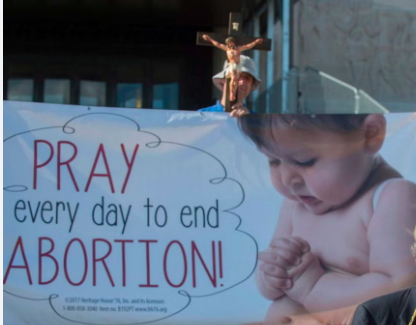Christianity, one of the world’s major religions, holds profound beliefs about the sanctity of life, human dignity, and the moral implications of various ethical dilemmas. Among these complex topics, the issue of abortion stands as one of the most debated and contentious subjects within the Christian faith. This article seeks to explore the intricate relationship between Christianity and abortion, delving into the theological, moral, and practical considerations that shape Christian perspectives on this sensitive matter.
Biblical Foundations and Interpretations
At the core of Christian beliefs regarding abortion lies the question of when human life begins. While the Bible does not explicitly address abortion, many Christian interpretations hinge on passages that emphasize God’s creation of life and His deep concern for every individual. One frequently cited verse is Jeremiah 1:5, where God declares, “Before I formed you in the womb, I knew you.”
The belief in the sanctity of life from conception is grounded in the idea that every human being is made in the image of God and possesses inherent dignity. This view often leads many Christians to consider abortion as morally unacceptable, as it is seen as a violation of the divine gift of life.
Denominational Diversity
Despite these shared principles, Christian denominations exhibit a wide range of stances on abortion, reflecting the diversity of theological interpretations and ethical perspectives within the faith. Catholicism, for example, maintains a strict pro-life position, condemning abortion as a grave moral sin that directly contradicts the Church’s teachings on the sanctity of life. Catholic doctrine asserts that life begins at conception, and any deliberate termination of a pregnancy is tantamount to taking an innocent life.
Protestant denominations, on the other hand, present a spectrum of perspectives. While some, like Evangelicals, align closely with Catholic teachings on the sanctity of life, others adopt a more permissive stance, often emphasizing individual freedom and personal circumstances as factors to consider when evaluating the morality of abortion.
Theological Nuances
Christianity’s relationship with abortion extends beyond scriptural interpretations to encompass broader theological considerations. One viewpoint emphasizes the concept of forgiveness and redemption. Some Christians argue that while abortion might be considered morally wrong, divine grace and forgiveness are available to those who have undergone the procedure. This perspective underscores the Christian belief in the transformative power of God’s love and mercy.
Another theological facet centers on the concept of suffering. Advocates of this perspective contend that prioritizing the well-being of a pregnant woman might at times necessitate making difficult decisions, including the consideration of abortion in cases of severe health risks or instances of rape and incest. In such cases, the principle of loving one’s neighbor as oneself comes to the forefront, prompting Christians to weigh the potential suffering of both the woman and the unborn child.
Social and Practical Realities
In the realm of practicality, the Christian approach to abortion often intersects with broader social issues, including healthcare access, education, poverty, and family planning. Advocates of a pro-choice stance argue that ensuring women have access to comprehensive healthcare, contraception, and family planning resources aligns with Christian values of compassion, justice, and care for the vulnerable. By providing women with the means to make informed choices, these resources can potentially reduce the incidence of unwanted pregnancies and, consequently, the need for abortion.
Christian Activism and Engagement
Across denominations, Christian individuals and organizations have played active roles in the abortion debate. Pro-life Christians, driven by their convictions, engage in various forms of advocacy, including participating in demonstrations, supporting crisis pregnancy centers, and working to influence legislation. Their actions stem from a commitment to protect what they view as innocent lives and to uphold the principles of their faith.
On the other side, pro-choice Christians emphasize the importance of respecting individual autonomy and the diverse circumstances that can lead a woman to consider abortion. They work to ensure that policies are in place to provide comprehensive healthcare, support systems, and educational resources that empower women to make informed decisions without undue coercion.
Conclusion
The relationship between Christianity and abortion is a complex tapestry woven from scriptural interpretations, theological insights, and the practical realities of individual lives. While a fundamental belief in the sanctity of life unites many Christians, the diversity of perspectives within the faith underscores the complexity of this issue. The debate surrounding abortion within Christianity underscores the ongoing tension between core principles and the complexities of human existence.
As the dialogue continues, it is essential to approach the matter with empathy, respect, and an understanding of the multifaceted factors that shape individuals’ beliefs and choices. By fostering open conversations that consider theological perspectives, ethical dilemmas, and practical implications, Christians can engage in a constructive discourse that respects the dignity of all parties involved while acknowledging the deeply rooted values that guide their views.
